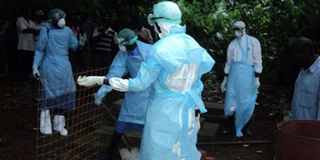Premium
Suspected outbreak of Marburg virus kills eight in Tanzania, WHO says

Health officials bury a victim of the Marburg virus disease.
What you need to know:
- Marburg virus can spread between people through direct contact or via blood and other bodily fluids of infected people, including contaminated bedding or clothing.
- An outbreak in the Kagera region in March 2023 killed six people and lasted for nearly two months.
Nairobi
A suspected outbreak of the Marburg virus in northwest Tanzania has infected nine people, killing eight of them, the World Health Organization has said, weeks after an outbreak of the disease was declared over in neighbouring Rwanda.
The viral hemorrhagic fever has a fatality rate as high as 88%, and is from the same virus family as the one responsible for Ebola, which is transmitted to people from fruit bats which are endemic to that part of East Africa.
The WHO said it received reliable reports of suspected cases in the Kagera region of Tanzania on Jan. 10, with symptoms of headache, high fever, back pain, diarrhoea, vomiting blood, muscle weakness and finally external bleeding.
Also Read: Marburg virus, Ebola's deadly cousin
Samples from two patients were awaiting testing at Tanzania's national laboratory for confirmation of the outbreak, WHO said in a statement on Tuesday.
The patients' contacts, including healthcare workers, have been identified and were being followed up, WHO reported.
The outbreak in Rwanda, which shares a border with Tanzania's Kagera region, infected 66 people and killed 15 before it was declared over on December 20.
Marburg virus can spread between people through direct contact or via blood and other bodily fluids of infected people, including contaminated bedding or clothing.
An outbreak in the Kagera region in March 2023 killed six people and lasted for nearly two months.



